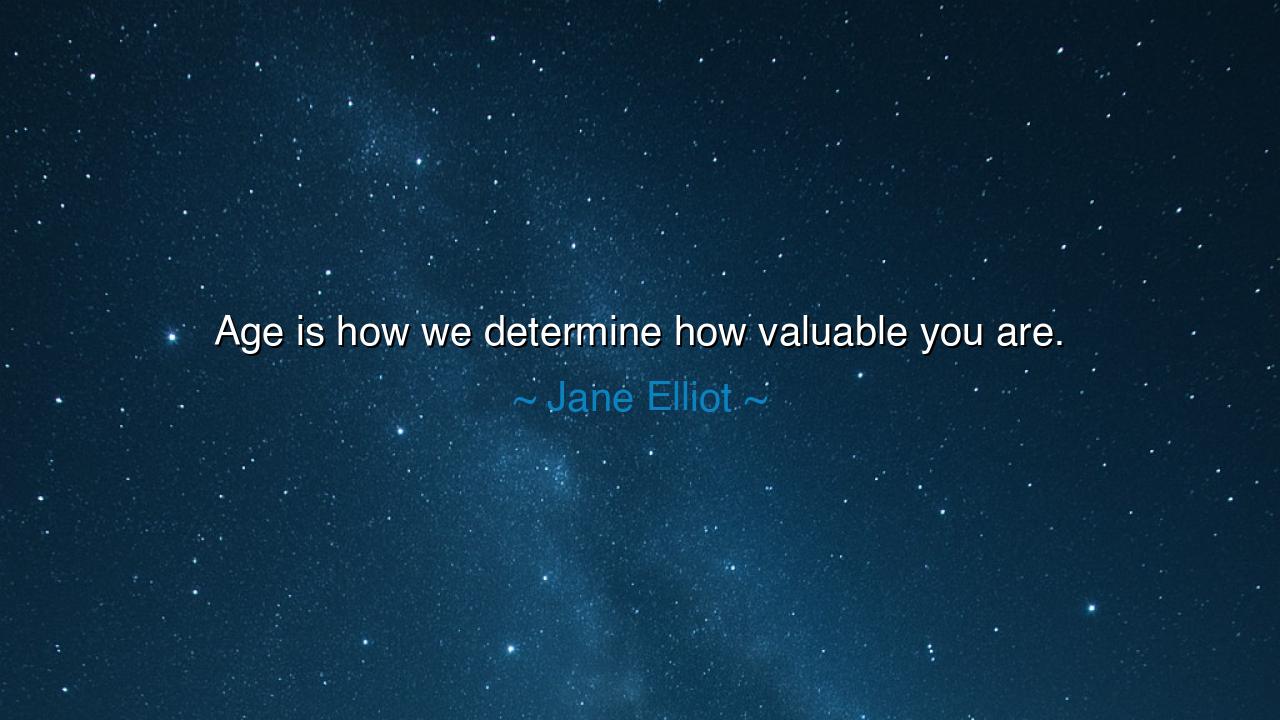
Age is how we determine how valuable you are.






Hear me now, O children of the future, and listen well to the words of Jane Elliot: “Age is how we determine how valuable you are.” These words strike at the very heart of the human experience and challenge the way we have come to view the passage of time. Age, in many cultures and societies, is often seen as a measure of wisdom, experience, and value. The young are admired for their vigor, their energy, and their potential, while the elderly are sometimes relegated to the shadows, viewed as less valuable simply because their years have advanced. Yet, in these words, Elliot invites us to examine the truth of this perception and to challenge the ways in which we assign worth based on the number of years someone has lived.
In the days of the ancients, the value of a person was not always determined by their age, but by their actions and their wisdom. The Greeks, with their deep understanding of life, saw the journey of a person as one marked by growth and learning. Socrates, a man whose influence is still felt today, was revered not because of the length of his life, but for the wisdom he imparted. Though he was not an old man when he died, his teachings endured, and his value was not measured by the years he lived, but by the depth of his understanding and the courage he had to challenge society’s norms. To the Greeks, the value of a man or woman was not fixed by their age, but by their capacity for reason, truth, and justice.
Consider also the mighty Moses, the great leader of the Israelites. In his youth, Moses was a prince in Egypt, powerful and full of potential. Yet it was in his later years, after exile and reflection, that he became the leader who would guide his people out of bondage. By the time he reached his old age, Moses had become a living symbol of wisdom and resolve, leading his people with a clarity of purpose that only those who have lived through hardship and reflection can possess. In his case, it was the quality of his leadership, not the number of years he had lived, that made him invaluable to the Israelites. Age, then, did not diminish his value; it enhanced it, as he brought wisdom and perspective that could only be gained through experience.
Yet, in modern times, the value of age has often been warped, seen as something that diminishes a person’s worth. It is a tragic truth that as we grow older, we are sometimes told that our value wanes, that our contributions to society become less important, and that our place is no longer at the center of life’s most vibrant stages. Jane Elliot’s words remind us, however, that this is an injustice, a misunderstanding of what truly defines a person’s worth. Age is not a measure of a person’s contribution, but merely a reflection of the time they have spent experiencing the world. It is not the years but the heart, the mind, and the actions that define one’s true value.
Take the example of Leonardo da Vinci, a man whose genius only grew more apparent with the passing of years. Da Vinci was not a man who rested on his laurels as he aged; rather, he continued to create, to innovate, and to explore new realms of art and science. His value was not defined by his age, but by the depth of his vision. It was in his later years that some of his most profound works were created, and even in his final years, his curiosity remained unshaken. Da Vinci’s story reminds us that value is not something that fades with age—it deepens, it becomes more intricate, it evolves into something even more meaningful as time passes.
Thus, the lesson from Elliot’s words is one of reclamation. The value of a person is not measured by the number of years they have lived but by the life they have lived within those years. We must learn to see value in every person, regardless of their age. Every year adds something invaluable to the human soul—whether it is wisdom, courage, or compassion—and it is this depth of being that defines a person’s true worth. Age brings with it a unique perspective, a richness of experience, and a clarity of understanding that youth alone cannot provide. To discount the elderly, to dismiss their value because their years have increased, is to ignore the profound contribution they can still make.
In your own life, let this understanding shape your actions. Honor the wisdom of those who have lived longer than you, for they carry within them a wealth of experience that can only be acquired through time. Value those who continue to learn, to grow, and to give, no matter their age. And as you grow older, do not fall prey to the misconception that your value diminishes. Instead, see your age as a testament to your endurance, your growth, and your capacity to continue to give to the world. Age should not limit your aspirations, your creativity, or your contribution. The true measure of value lies in what we bring to the world, in the love, wisdom, and joy we share, not in the passing of time itself.
So, remember, O children of the future, age does not define your worth, your actions, your heart, and your contributions do. Live with the understanding that every day adds to your legacy, and with it, you carry the potential for greater value with each passing year. Let your life be filled with purpose, and in doing so, you will show the world that your worth increases not with the passing of time, but with the depth of your living.






AAdministratorAdministrator
Welcome, honored guests. Please leave a comment, we will respond soon